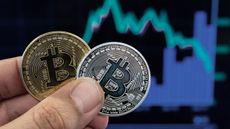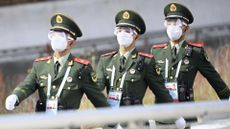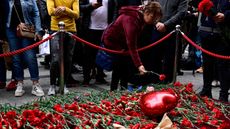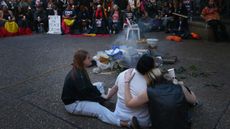What next for ‘strife-torn’ Haiti after assassination of Jovenel Moise?
Interim prime minister replaced by murdered leader’s pick for top job
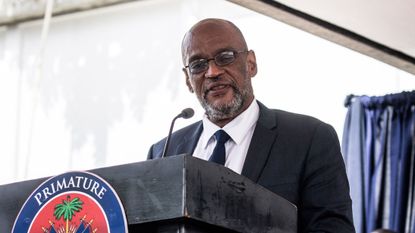
A free daily digest of the biggest news stories of the day - and the best features from our website
Thank you for signing up to TheWeek. You will receive a verification email shortly.
There was a problem. Please refresh the page and try again.
Ariel Henry has been sworn in as Haiti’s new prime minister following the assassination two weeks ago of the man who handpicked him for the role.
President Jovenel Moise chose Henry just days before being gunned down at his home in the capital Port-au-Prince. But Moise’s death triggered what the BBC describes as a “political tussle” between Henry and interim PM Claude Joseph, who had been in the post since April.
Addressing crowds in the nation’s capital after being sworn in yesterday, Henry said that “one of my priority tasks will be to reassure the people that we will do everything to restore order and security”. Yet pundits fear this challenge may prove too great for the new PM, who inherits a “strife-torn” nation that “was already mired in political and security crises, no working parliament, frequent anti-government protests and a surge in gang violence”, the broadcaster reports.
Subscribe to The Week
Escape your echo chamber. Get the facts behind the news, plus analysis from multiple perspectives.

Sign up for The Week's Free Newsletters
From our morning news briefing to a weekly Good News Newsletter, get the best of The Week delivered directly to your inbox.
From our morning news briefing to a weekly Good News Newsletter, get the best of The Week delivered directly to your inbox.
‘Protracted interference’
“Everyone who knows me, knows that I am not interested in this battle, or in any kind of power grab,” Joseph told The Washington Post after agreeing on Sunday to step down. “The president was a friend to me. I am just interested in seeing justice for him.”
But despite Joseph’s seeming olive branch, whether Henry faces a “battle” to restore order is likely to be decided by shadowy criminal forces within Haiti who have long been assumed to be pulling the strings behind the facade of a democratic society.
The details surrounding Moise’s assassination “remain a mystery”, says the BBC.
All the same, his killing is “brutally representative of the situation” in “a country that since 2018 has been convulsed by protests and violence”, says The Guardian, and “where guns - and those prepared to use them - are the currency in an escalating crisis”.
The most impoverished country in the western hemisphere, Haiti “has become routine to see one of the world’s most corrupt and ill-governed states lurch from catastrophe to catastrophe, amid coups, failed governments and natural disasters”, the newspaper continues.
As the first black-led independent country following a successful slave revolt in the late 18th century, Haiti has “faced blockades, isolation and protracted interference over two centuries from white-majority powers, including France, which imposed a century of impoverishing reparations for the loss of its slaves, only paid off in 1947”.
In 1990, former priest Jean-Bertrand Aristide was chosen as the nation’s PM in what is widely considered to be the country’s first truly democratic election. However, he was ousted a year later in a CIA-backed coup.
And Western powers have continued to interfere in Haiti.
As The Independent notes, Joseph said he would stand aside as PM just “two days after a group of key foreign nations” announced that they supported Henry to take over.
“Neither had been elected,” the paper adds. And while “from a distance, it might appear the arrangement brokered by the international community was intended to offer calm amid chaos and anxiety”, some Haitians feel that the intervention “mirrors the fate suffered by Haiti for generations - or even centuries”.
“Some of the toxic consequences of intervention have been obvious,” says The Guardian, but others, such as the conditional delivery of aid, “have been more subtle”.
“Rather than strengthening institutions, the mechanisms by which [aid] has been delivered inherently undermine [Haitian institutions], especially in more recent decades, which has seen the outsourcing of the state,” Jake Johnston, a researcher at the Washington D.C.-based Center for Economic and Policy Research, told the paper.
“Aid to Haiti has been used for political purposes going back years. It is transactional. It has gone up under certain leaders and it has gone down when someone isn’t liked, or it goes to an organisation that shares the interest of the donor country.”
What next?
Civil society leaders in Haiti have “sharply criticised the international community for backing Henry”, arguing that “a new interim government decoupled from Haiti’s jostling political parties” should be formed to organise elections, The Washington Post says.
Many “had been calling for Moise to step down” prior to his death, the paper adds, and have pledged not to recognise “anyone as interim leader whom the slain president had named”.
“Haitians are facing systematic human rights violations - corruption, assassination, gangs massacres,” lawyer Rosy Auguste Ducena, an activist with the human Haiti-based National Network for the Defense of Human Rights, told The Independent.
Meanwhile, foreign intervention - both military and humanitarian - means the international community “dictates what they want to see in Haiti”, she continued. “But, at the end of the day, we have not seen any improvement in the situation.
“Today, the civil society is asking for a chance to let Haitians find solutions to their own problems, without international interference.”
However, some pundits point out that a “profound disconnect between a barely governing ruling class, drawn from a wealthy elite, and the barely governed” has created “little incentive for those notionally in charge to combat Haiti’s many problems”, says The Guardian.
According to the paper, Henry is seen by many as the latest in a string of leaders drawn from the same stock, prompting suggestions that “politicians and criminals alike” will continue to “enjoy impunity”, relying “on armed gangs - operating like paramilitaries - rather than electoral accountability to remain in office”.
Moise’s reign saw him “steadily hollow out Haiti’s institutions” amid allegations of “corruption and links to gangs”, says the Financial Times. “But his sudden demise leaves a dangerous vacuum.”
The Joe Biden administration has said that the 100,000 Haitians who arrived in the US before 21 May will be granted the right to apply for Temporary Protected Status, an offer extended to citizens of countries suffering from natural disasters or armed conflict.
But “that won’t help anyone who has decided to leave Haiti in light of the recent constitutional crisis and power struggle”, says Vox.
Nor will it solve the ongoing issues at home, where Henry has inherited a “long-running democratic crisis” stemming from a perception that multiple “governments have been largely divorced from Haitians’ lives of poverty”, The Guardian adds.
Instead, his appointment has perpetuated the sense that Haiti’s political class come “from within the same tight circle of politically connected oligarchs with the blessing of foreign powers, not least Washington”.

Continue reading for free
We hope you're enjoying The Week's refreshingly open-minded journalism.
Subscribed to The Week? Register your account with the same email as your subscription.
Sign up to our 10 Things You Need to Know Today newsletter
A free daily digest of the biggest news stories of the day - and the best features from our website
-
 Quiz of The Week: 30 September - 6 October
Quiz of The Week: 30 September - 6 OctoberPuzzles and Quizzes Have you been paying attention to The Week's news?
By Sorcha Bradley, The Week UK Published
-
 'Calling women "ladies" belongs in the dark ages'
'Calling women "ladies" belongs in the dark ages'Instant Opinion Opinion, comment and editorials of the day
By The Week Staff Published
-
 Mercy killings: what new CPS guidance means for assisted dying law
Mercy killings: what new CPS guidance means for assisted dying lawThe Explainer Prosecutors detail circumstances when it is appropriate not to bring charges
By Chas Newkey-Burden, The Week UK Published
-
 Dodgy cash disguised as sandwiches
Dodgy cash disguised as sandwichesTall Tales And other stories from the stranger side of life
By Chas Newkey-Burden Published
-
 Argentinian police arrest biggest online distributor of Nazi propaganda
Argentinian police arrest biggest online distributor of Nazi propagandaSpeed Reads Officials seized hundreds of texts glorifying Adolf Hitler, denying Holocaust and bearing swastikas
By Harriet Marsden Published
-
 How North Korean hackers stole billions in crypto
How North Korean hackers stole billions in cryptoSpeed Read Pyongyang-backed cyber gangs use ‘mixers’ to launder their criminal proceeds
By Chas Newkey-Burden Published
-
 Brain-damaged seals attack bathers
Brain-damaged seals attack bathersfeature And other stories from the stranger side of life
By Chas Newkey-Burden Published
-
 Why have the JFK assassination files been kept secret for so long?
Why have the JFK assassination files been kept secret for so long?In Depth Joe Biden is set to finally release thousands of documents this week despite pressure from CIA and FBI
By The Week Staff Published
-
 Chinese secret police stations around the globe
Chinese secret police stations around the globefeature Report claims Chinese citizens in exile are monitored and coerced by their own authorities
By The Week Staff Published
-
 Turkish government blames Kurdish separatists for Istanbul bombing
Turkish government blames Kurdish separatists for Istanbul bombingSpeed Read Blast in busy street on Sunday killed six people and wounded scores more
By Chas Newkey-Burden Published
-
 Thousands attend vigils for Cassius Turvey in Australia
Thousands attend vigils for Cassius Turvey in AustraliaIn Pictures Case of murdered Aboriginal schoolboy has ‘shocked’ the nation
By Chas Newkey-Burden Published





